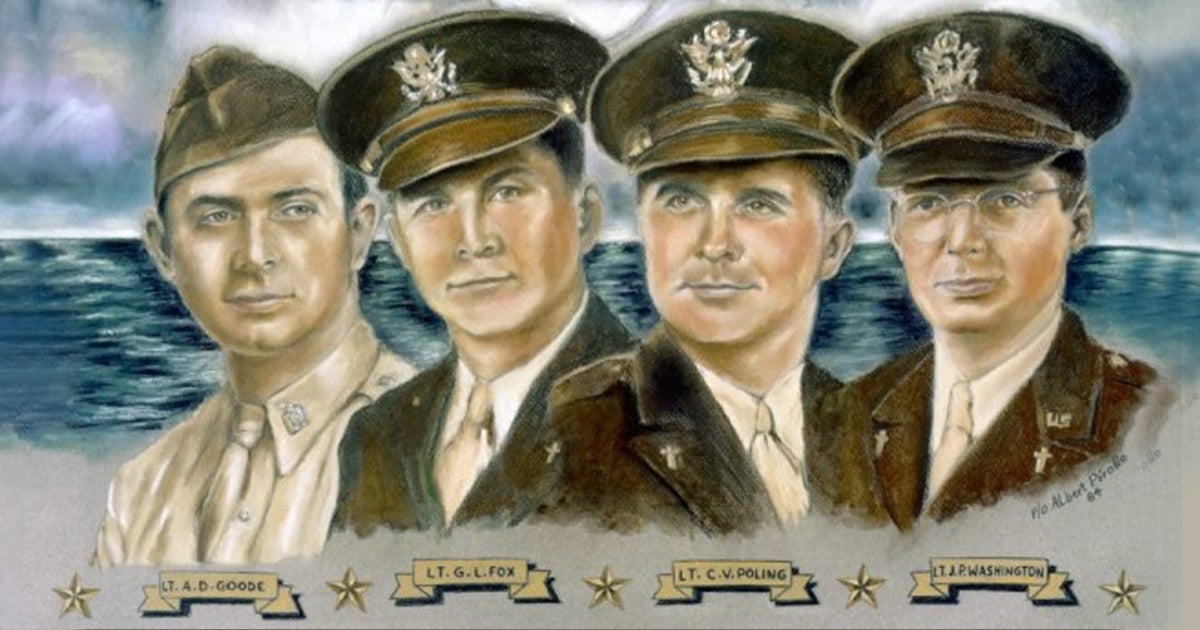
by Jorge Gomez • 6 min read
“Greater love has no one than this: to lay down one’s life for one’s friends.” – John 15:13
There aren’t enough pages to retell the thousands (indeed countless) heroic stories of American military service members who’ve made the ultimate sacrifice and have laid down their lives to save their brothers or sisters in arms.
Perhaps one of the finest examples of courage to God, man and country is that of four military chaplains: John P. Washington, Alexander D. Goode, George L. Fox and Clarke V. Poling.
Though they were not infantrymen, they embodied and represented the high calling written in John 15:13.
During World War II, these four men served valiantly as their transport ship sank in the North Atlantic. Their self-sacrifice to save other soldiers’ lives and offer spiritual encouragement captures the very best of what it means to be a minister in uniform.
Today, we honor and admire their military heroism. But their story also teaches us a profound lesson about religious liberty and why it’s so critical for men and women in America’s military to have the freedom to live out their faith.
They fought for us, and we now fight for them.
Your support helps First Liberty reclaim religious freedom for America’s military service members.
On February 3, 1943, the American transport ship Dorchester steamed through the North Atlantic, just off the coast of Greenland.
It was a frigid, icy morning, and the atmosphere was especially tense. The 902 soldiers on board knew they were navigating the treacherous waters known as “Torpedo Junction,” where German submarines were sinking Allied merchant ships by the hundreds.
Ship Captain Hans J. Danielson’s sonar readings indicated an enemy sub was nearby. Knowing danger was imminent, he ordered the men to slip into life jackets and to be on high alert.
Suddenly, a booming explosion confirmed the worst. A German torpedo hit the Dorchester directly, and it was certain the entire ship would sink within minutes. Panic struck as the men desperately sought to abandon the vessel.
But amidst the chaos, the four chaplains—two Protestants, one Catholic and one Jewish—gave their life jackets to those who had none. Then, the four men of God linked arms and began shouting encouragement to the soldiers floating in the lifeboats and the icy waters below.
As the ship went down, the perishing men first heard the Lord’s Prayer. Each of the chaplains preached faith in God, offering the soldiers spiritual words of comfort in their final moments of life.
One survivor, John Ladd, recounted: “It was the finest thing I have seen or hope to see this side of heaven.”
Another survivor, PFC William Bednar later said: “Their voices were the only thing that kept me going.”
Twenty-seven minutes after the torpedo struck, the ship drowned beneath the waves, taking the four chaplains and more than 600 soldiers to their deaths.
Imagine if the four chaplains hadn’t been aboard the Dorchester that day. Without the chaplains’ spiritual passion and devotion, the soldiers on that ship would have faced the certainty of death without any hope, comfort or source of encouragement.
Their story is a powerful reminder of why religious liberty is so crucial in our country, and why this First Freedom is also vital in America’s armed forces.
First, our nation’s high regard, respect and its enshrined constitutional protections for religious freedom are the reasons why we’re able to have a military chaplain corps.
On a more profound level, when we defend religious freedom within America’s military, we’re helping to ensure that chaplains and service members of all faiths can continue to use their religious beliefs as a source of inspiration.
For thousands who serve in uniform, their faith and religious convictions are the wellspring of what drives them to minister, serve, sacrifice and, many times, to lay down their lives.
This remains true today, as it did back in 1943 when the Four Chaplains gave their lives.
Throughout American history, over 400 military chaplains have died in war, sacrificing their lives for their troops, many of them receiving recognition for their valor.
As recently as the Iraq War, U.S. Army Chaplain Henry Tim Vakoc was returning from Mosul after conducting a mass in the field, when he was severely injured by a roadside bomb. He was paralyzed and lived with physical impediments until his death 2009. He was awarded the Purple Heart, Bronze Star and Combat Action Badge for his heroism.
Here at First Liberty, we’ve had the privilege of defending religious freedom for men and women who’ve been heroes on the spiritual battlefront. Those include former First Liberty client and retired U.S. Navy Chaplain Wes Modder, a decorated veteran with 20 years of unblemished service, including a role as a force chaplain to Navy SEAL Team Six.
Or, compassionate men like First Liberty’s former client Chaplain Joseph Lawhorn, who conducted suicide prevention trainings and used his personal testimony of how his Christian faith helped him counter depression.
In this time of heightened hostility to religious freedom, we must defend the fundamental liberty of service members to live and serve according to their faith. For chaplains, having religious freedom is the difference-maker, what allows them to become heroes on the spiritual battlefront. And oftentimes, it’s because of their faith—and the freedom to live it out—that they become heroes on the frontlines and the trenches of war.